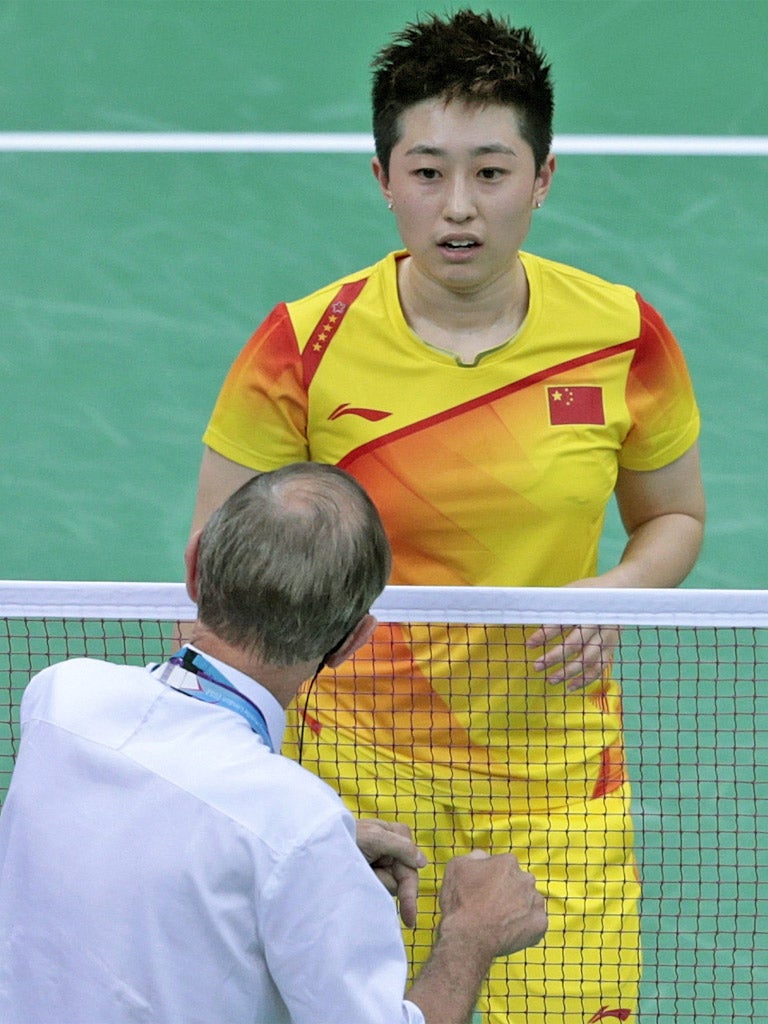Chris Hewett: Badminton smells fishy but cheating in pursuit of glory is as old as sport
The critic without a ticket: Someone will surely pull a similar stunt at these Olympics, but nowhere near as arrogantly

A small matter of 104 years ago, a Boer War veteran by the name of Lieutenant Wyndham Halswelle won the gold medal in the 440-yard sprint at the first London Games. He had started as a fairly warm favourite: not because he was the Michael Johnson of the era, but because there was nobody else in the race. The American contender John Carpenter had been disqualified for deliberately impeding Halswelle in the first running of the contest, a furiously disputed decision that persuaded the two remaining finalists, also from the land of the free, to take up their running spikes and push off home without running another inch.
So it was that the idea of Olympic cheating first lodged itself in the wider sporting consciousness. Of course, there must have been plenty of dodgy dealing in the Games of Ancient Greece – who can say that Pythagoras himself, said to have been a team doctor for competitors from the city of Kroton, was not the Victor Conte of his age? – but any chicanery attached to naked javelin throwing or the four-horse chariot race is a subject for the historian in his rooms on the front quad, not for the present-day sports nut staring at his telly in the front room.
As far as we are concerned, it was the Carpenter Affair that started something. Something that continues to this day and will not end as long as the sporting and, more specifically, the unsporting, congregate in pursuit of glittering prizes.
"Moral indignation is jealousy with a halo." So said H G Wells, who, for all his brains, was surely spectacularly wrong. Were those honest athletes adversely affected by the chemical shenanigans surrounding the 100m sprint final in Seoul – a race defined in all its darkness by Ben Johnson and his stanozolol intake but further distorted by many of his fellow finalists – really jealous? Or were they bloody angry? As angry as all the other competitors who have had their moments stolen from them by rivals on the fiddle.
The annals tell us that some Olympic disciplines – athletics and weightlifting, primarily – are infinitely more doped-up than others, but there have been very funny goings-on elsewhere down the years. In 1968, the Swedes were thrown out of the modern pentathlon because Hans-Gunnar Liljenwall tested positive for… alcohol. It seems he had sunk a couple of beers during the event, for the not terribly reassuring reason that it steadied his nerves before the shooting section.
And if Liljenwall thought he was hard done by, how about the Mongolian judoka Bakhaavaa Buidaa, ejected from the Munich Games in 1972 for having too much caffeine in his blood? That, truth to tell, would rule most of us out of medal contention.
Do we imagine that the equestrian events are always clean? Imagine again. The Americans were disqualified from the team dressage in Beijing four years ago because one of their horses was carrying an illegal anti-inflammatory – in its blood, not in its saddle pocket – and there was a really smelly incident involving the Irish show jumper Cian O'Connor in 2004, which started with a positive test for a banned sedative in the urine of the horse Waterford Crystal and continued to unfold in all sorts of weird and wonderful directions, culminating in the theft of a crucial "B" sample.
Which leads us neatly to events on the badminton court involving players from three Asian nations with a serious tradition in the sport: South Korea, China and Indonesia. Cheating? In badminton? The sport of Middle England – of back gardens, church halls, halves of bitter shandy and voluminous knickers?
It takes some believing, but the sight of eight high-calibre female practitioners performing uncannily accurate impersonations of Hilda and Doris Bonkers down the local sports centre indicated that all was not well in the world of the shuttlecock.
Initial reactions were far more interesting than those that emerged after news of the mass disqualification was confirmed. The paying public knew they were being fleeced at the time: overcome by the stench of rotting fish, they quickly registered that the culprits were doing their damnedest to improve their chances of winning the tournament by losing their respective group matches and responded, entirely appropriately, with a cacophony of boos, hisses and slow handclaps.
Gail Emms, a mixed doubles silver medallist in Athens eight years ago, also knew what was going on and why. Her reaction, communicated via Twitter? "I don't blame them." The players, that is, not the crowd. No, really. What is it about this particular form of social media that drives adherents to take its first syllable quite so seriously?
Emms slipped into reverse gear so quickly, she could have made a double Olympian of herself by winning the single sculls. "Truly disgraceful," she said, wearing her BBC reporter's hat. "So embarrassing. I think my two-and- a-half-year-old could have won one of those matches." Her two-and-a-half-year-old might also have thought twice before suggesting that the behaviour of eight brilliant players from the Far East was remotely justified.
What happened at Wembley Arena on Tuesday was pretty much as bad as it gets, but the guardians of sport cannot test for effort and honesty in the way they test for stanozolol, or booze, or excess levels of coffee. Someone, somewhere will pull a similar stunt at these Olympics, but nowhere near as arrogantly. And that someone will escape undetected. Depressing.
Join our commenting forum
Join thought-provoking conversations, follow other Independent readers and see their replies
Comments